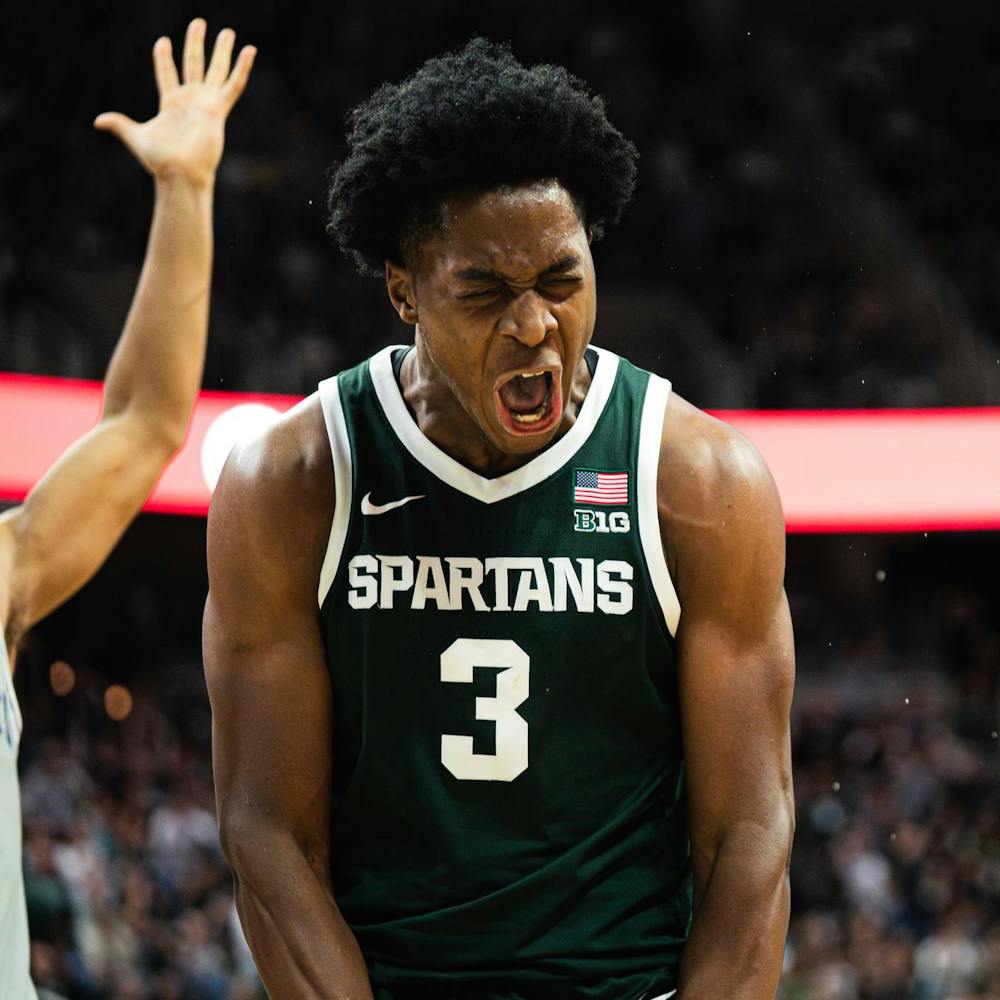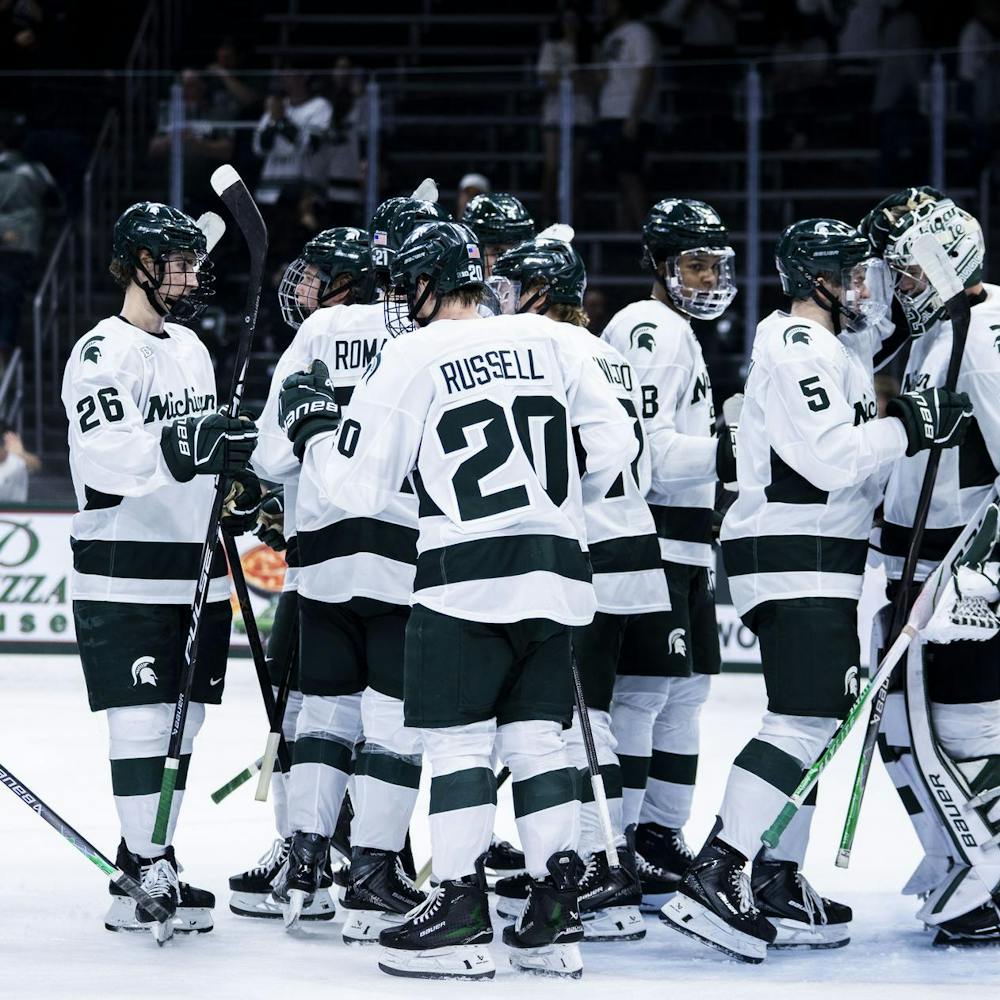Twenty one.
It separates the old from the young, the bar crowd from the house partyers, the legal imbibing from the MIP.
Twenty one.
It's as much a college lifestyle as an age — opening up barroom doors to an exclusive adult world of music, dancing and drinking that dominates East Lansing's downtown during the weekends.
Twenty one.
For many health experts and sociologists, it's a misunderstood number, fraught with exaggerated stigmas, misinformation and peer pressure.
Twenty one.
It's the number of shots student Brad McCue downed as part of a drinking ritual at Rick's American Café in 1998, killing the man on his birthday and catapulting the issue of celebratory binge drinking in East Lansing to the forefront.
Advocates battle stigmas to inform students
Part of the problem with drinking is that many students are uninformed about their peers' behavior or the social norms of drinking, said Becky Allen, a health educator for alcohol, tobacco and other drugs at Olin Health Center.
According to the 2004 National College Health Assessment, the percentage of peers students thought to consume alcohol on a daily basis increased steadily from 2000 to 2004, while the survey found that there was no clear increase or decrease in consumption.
While more than 38 percent of respondents thought the typical student consumed alcohol daily, less than one percent stated that they actually did drink every day.
In addition, the average number of drinks students reported consuming the last time they partied declined steadily from 5.4 in 2000 to 4.9 in 2004.
Olin has publicized the true social norms as part of a campaign urging students to drink responsibly. One poster the health center used said 65 percent of students partied to have fun, while only 5 percent partied to get drunk.
"This is not an abstinence-only message, but what we do want to make sure that if students make the decision to drink, that they do it in a safe manner," Allen said.
The misperceptions about what everyone else is doing contributes to dangerous behavior on 21st birthdays, Allen said.
"The assumption is that when you turn 21, it's a rite of passage to drink large amounts of alcohol," Allen said. "There is a lot of supposed tradition around turning 21."
However, Allen said studies show dangerous drinking is decreasing at MSU, and more people are realizing the dangers associated with abusing alcohol.
"Students are getting wiser and wiser about what to do," she said.
Expert: Society increases fascination with drinking
Drinking 21 shots on a 21st birthday — sometimes within the hours of midnight and when the bar closes — is a relatively recent practice, said David Hanson, a retired sociology professor from the State University of New York at Potsdam.
Changing the minimum drinking age to 21 in the mid-1980s exacerbated the binge drinking problem among college students, especially on their birthdays, he said.
Hanson has studied alcohol and behavior for his entire career. He now operates a Web site on alcohol problems and solutions based on his research, which started in the late 1960s.
"We've associated it with adulthood by making it age 21," he said. "We've made it a more appealing thing."
When 18-year-olds were able to drink, it normalized the practice, he said, adding that college students could have had a beer with lunch or dinner as part of a normal routine.
The dynamic was evident in Hanson's classes on alcohol, where students regularly commented on how drinking was no longer as much fun after they turned 21. The idea isn't limited to any time or generation. While researching prohibition, Hanson said he talked to many elderly women who expressed how much fun it was to go into the speakeasies, where illegal alcohol was sold.
"We've increased the fascination," he said.
Student's death spurs change in the community
In the early morning hours of Nov. 5, 1998, Brad McCue lied in his bed and passed out after a short night of hard partying.
His friends had brought him home after a night of celebratory drinking for McCue's birthday.
He threw back 21 shots at Rick's American Café, as part of a 21st birthday drinking ritual. The first one, a shot of Sour Apple Pucker, was on the house as part of the bar's tradition at the time.
After the parks and recreation junior finished his 21st shot, he drank three more to beat the record among his friends, all in a two-hour time period from midnight to 2 a.m.
Tucked away in his bed, with a blood alcohol concentration that reached .44, Brad McCue stopped breathing at approximately 4:30 a.m. and died.
Rick's lost its liquor license for a month and paid $50,000 in fines after admitting to four charges, including providing alcohol to a visibly intoxicated person and giving away alcohol.
The incident became a catalyst for a number of alcohol-related initiatives in the East Lansing community.
McCue's death inspired his parents, John and Cindy, to start B.R.A.D., or Be Responsible About Drinking Inc., a nonprofit organization that sends birthday cards to people on their 21st birthdays to warn them of the dangers of excessive drinking.
The first cards went out to MSU students in the April following McCue's death. The McCues sent the cards to students at other schools the following autumn.
Cindy McCue said she's amazed every day at what the organization has become. It now includes three part-time staff members and has served more than a hundred schools throughout the country.
A survey conducted by Olin Health Center officials in 2001 and 2002 among students who received the cards found that 12 percent changed their birthday celebrations — 8 percent by being more aware and cautious of their drinking, 3 percent by drinking less and 1 percent by having a friend watch them during the celebration. Twenty-two percent reported thinking about the card during their birthday celebration.
"We get thank yous on a regular basis from both students and parents," Cindy McCue said.
Restaurant and bar owners created the Responsible Hospitality Council, or the RHC, in February 1999 to promote responsible drinking. In the coming years, the RHC worked to identify problems associated with drinking and urged members to cut down on cheap drink specials.
In April 2003, 16 bars and restaurants adopted new guidelines for serving people on their 21st birthdays, including assigning one server to the birthday group and not offering free or discounted drinks.
"We feel, as a group, that we've made some big changes," said Joe Goodsir, co-owner of Rick's and co-founder of the RHC. "It's changing peoples' perceptions on what people should do on their 21st birthday."






